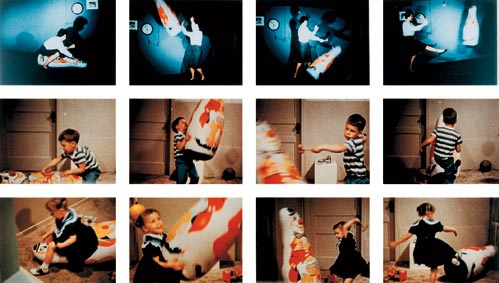Chapter Two: Theorists and Theories of Development
Social Cognitive Theory
Albert Bandura (1925-) is perhaps most famous for his Bobo Doll experiments in the 1960s. At the time there was a popular belief that learning was a result of reinforcement. In the Bobo Doll experiments, Bandura presented children with examples of violent behavior or non-violent behavior towards the inflatable Bobo Doll. Children who viewed the violent behavior were in turn violent towards the doll; the control group was rarely violent towards the doll. That became Bandura’s social learning theory in the 1960s, a learning theory based on the idea that people learn by observing and interacting with others. It is often called a bridge between behaviorist and cognitive learning theories because it encompasses attention, memory, and motivation. Social learning is also commonly referred to as observational learning, because it comes about as a result of observing models. Bandura became interested in social aspects of learning at the beginning of his career. Early theories considered behavior to be a function of the interaction between a person and their environment. Bandura believed that behavior itself influences both the person and the environment, each of which in turn affects behavior and each other; the result is a complex interplay of factors. Social learning theory emphasizes that behavior, personal factors, and environmental factors are all equal, interlocking determinants of each other.

Bandura and his colleagues continued to show that social modeling is a very effective way of learning and went on to expand motivational and cognitive processes on social learning theory. In 1986, Bandura published his second book Social Foundations of Thought and Action: A Social Cognitive Theory, which expanded and renamed his original theory. He called the new theory Social Cognitive Theory (SCT). Bandura changed the name social learning theory to social cognitive theory to emphasize the major role cognition plays in encoding and performing behaviors. In this book, Bandura (1986) argued that human behavior is caused by personal, behavioral, and environmental influences. The theory states that when people observe a model performing a behavior, along with the consequences of that behavior, they remember the sequence of events and use this information to guide subsequent behaviors. Depending on whether people are rewarded or punished for their behavior and the outcome of the behavior, the observer may choose to replicate behavior modeled (Berk, 2017; Crain, 2011; Santrock, 2013).
Media provides models for a vast array of people in many different environmental settings.
HOT TOPIC: Violence in Media
There is still much debate over the influence exposure to media violence has on behavior, especially for children. These articles offer views on both sides of the discussion:
https://www.futurity.org/media-violence-aggression-1402632-2/
The American Psychological Association’s Policy Statement regarding media violence:
http://www.apa.org/about/policy/violent-video-games.aspx
Criticism of Social Cognitive Theory
One of the main criticisms of the social cognitive theory is that it is not a unified theory, meaning that the different aspects of the theory may not be connected. The theory is so broad that not all of its component parts are fully understood and integrated into a single explanation of learning. The findings associated with this theory are still, for the most part, preliminary. The theory is limited in that not all social learning can be directly observed. Because of this, it can be difficult to measure the effect that social cognition has on development. Finally, this theory tends to ignore maturation throughout the lifespan. Because of this, the understanding of how a child learns through observation and how an adult learns through observation are not differentiated, and factors of development are not included.
Educational Implications of Social Cognitive Theory
People can consciously change and develop their cognitive functioning. This is important to the proposition that how we view ourselves can also be changed or enhanced. From this perspective, people are capable of influencing their own motivation and performance. Improving performance, therefore, depends on changing some of these influences. In teaching and learning, the challenge upfront is to
- Get the learner to believe in his or her personal capabilities to successfully perform a designated task
- Provide environmental conditions, such as instructional strategies and appropriate technology, that improve the strategies and self-efficacy of the learner
- Provide opportunities for the learner to experience successful learning as a result of appropriate action
Social Cognitive Theory has numerous implications in classroom teaching and learning practices
- Students learn a great deal simply by observing others.
- Describing the consequences of behavior increases appropriate behaviors, and decreases inappropriate ones
- Modeling provides an alternative to teaching new behaviors.
- Teachers must model only appropriate behaviors and not model inappropriate behaviors.
- Teachers should expose students to a variety of models, including peers and other adult models.
- Students must believe that they are capable of accomplishing a task; it is important for students to develop a sense of self-efficacy.
- Teachers should help students set realistic expectations, while ensuring that expectations are realistically challenging.
Media Attributions
- Social Cognitive Theory © Simplypsychology is licensed under a All Rights Reserved license
a learning theory based on the idea that people learn by observing and interacting with others

